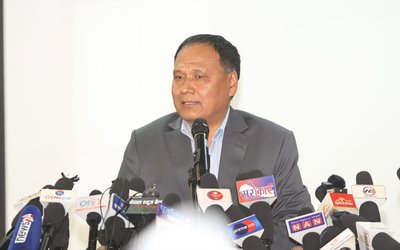
South Asia is home to almost a quarter of the world’s population and is endowed with vast water bodies and other natural resources. This region, comprising eight countries, namely, Afghanistan, Bangladesh, Bhutan, India, the Maldives, Nepal, Pakistan and Sri Lanka, is rich in cultural and biological diversity. A sizable portion of ecology and biological diversity is under stress as well. Climate change has threatened our social and economic development. The region is becoming more and more vulnerable and is facing rising frequency and intensity of floods, droughts, cyclonic storms and storm surges, landslides, glacial lake outburst floods, sea level rise and salinity intrusion. The IPCC reports reaffirm the likelihood of these severe, perverse and irreversible impacts.
Noting that South Asia is particularly prone to climate change and related disasters, the 16th Summit of the South Asian Association for Regional Cooperation (SAARC), held in Thimphu, Bhutan, in 2010, adopted the ‘Thimphu Statement on Climate Change’ as a means to further regional cooperation and actions on climate change. Last month, the 18th SAARC Summit held in Kathmandu, Nepal adopted the “Kathmandu Declaration” where the SAARC Heads of State or Government stressed on effective implementation of the SAARC Agreement on Rapid Response to Natural Disasters, SAARC Convention on Cooperation on Environment and Thimphu Statement on Climate Change, including taking into account the existential threats posed by climate change to some SAARC member states. The SAARC leaders underlined the urgency for the global community to arrive at a Protocol, another legal instrument, or an agreed outcome with legal force applicable to all by the end of 2015, based on the principles of Common but Differentiated Responsibility (CBDR), Respective Capabilities and Equity under the UNFCCC. Any delay in action on climate change will only add to our costs and the requirement of Adaptation. Therefore, Pre-2020 ambition and ratification of Kyoto Protocol 2nd Commitment Period is the urgent need of the hour. We must work out a post-2020 framework that is based on equity CBDR-RC and protects the poor and vulnerable people in South Asia from the disastrous impacts of climate change.
Allow me to speak on behalf of Nepal now. The mountainous country – Nepal – is most vulnerable to climate change. Our agriculture, forests, water and infrastructure sectors are greatly affected by the adverse effects of climate change posing food, water and energy insecurities. Climate-induced disasters have repeatedly claimed lives and properties. Moreover, disproportionate temperature rise in the Himalayas have caused glacier retreat, GLOF and frequent avalanches. This phenomena has exposed black rock in the beautiful ice caps, thereby seriously impacting on our tourism industry and on the lives and livelihoods of billions of people living around the Himalayas and downstream. Our development cost has increased by many folds and we must be compensated for this additional cost. In spite of our technical and financial limitations, Nepal has taken several policy, institutional and implementation measures, including implementation of NAPA prioritized most urgent and immediate adaptation actions. Nepal is preparing its low carbon development strategy. The Climate Change Council, chaired by the Right Honorable Prime Minister, ensures coordination and guidance at the political level. Considering the significant contribution that mountains make and the climate change vulnerability they possess, Nepal calls upon all Parties to develop a special Work Program on Mountains under the article 4.8 of the Convention to reduce the climate change vulnerability and associated loss and damage. We believe such a work program will help to enhance our knowledge in better understanding mountain ecosystems and enable us to adapt to, and build resilience to climate change.
Professor Dr. Pokharel is a vice chairman of National Planning Commission who led Nepali Delegation at the COP 20 in Lima. Excerpts of his statement delivered at the UNFCCC COP 20 meeting on behalf of head of delegation of LDCs, SAARC and Nepal.














